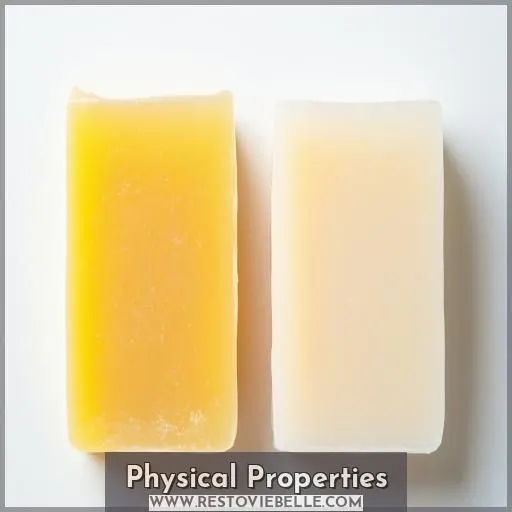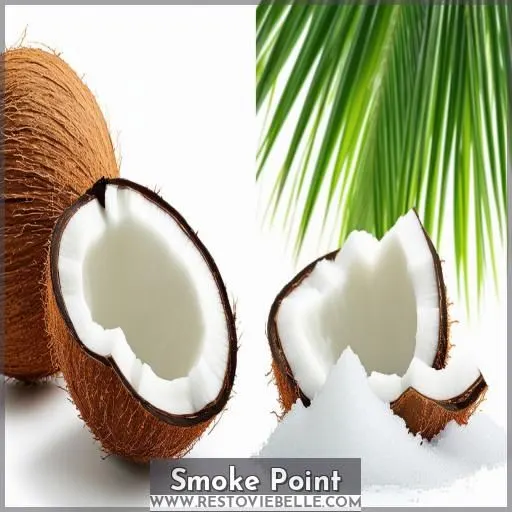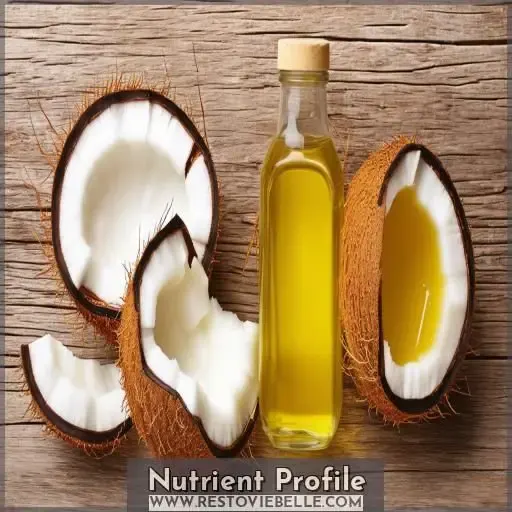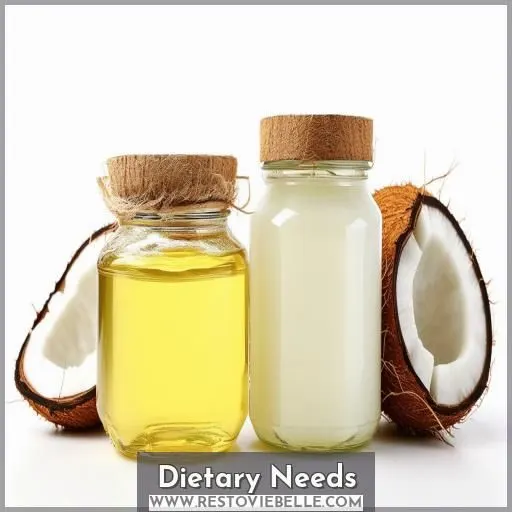This site is supported by our readers. We may earn a commission, at no cost to you, if you purchase through links.
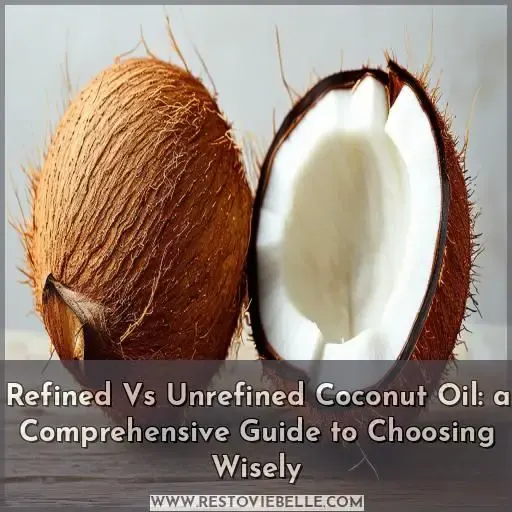 When choosing between refined vs unrefined coconut oil, consider their uses and characteristics.
When choosing between refined vs unrefined coconut oil, consider their uses and characteristics.
Unrefined oil is extracted directly, retaining its coconut flavor and nutrients, making it ideal for low to medium-heat cooking and skin care due to its strong aroma and moisturizing benefits.
Refined oil undergoes processes like bleaching and deodorizing, giving it a neutral taste, higher smoke point, and longer shelf life, perfect for high-heat cooking and baking.
Both types are rich in MCTs and lauric acid, fitting well into keto diets.
Stay tuned to discover how these details can influence your culinary and self-care choices.
Table Of Contents
Key Takeaways
When picking between refined and unrefined coconut oil, it’s like choosing a paintbrush for your culinary masterpiece. Unrefined oil, with its bold coconut flavor and aroma, adds a vibrant touch to your dishes. Refined oil, on the other hand, is a blank canvas, allowing your other ingredients to shine.
For baking enthusiasts, refined coconut oil is your trusty sidekick. Its neutral flavor won’t overpower your recipes, and it blends seamlessly, ensuring a smooth texture. It’s like having a secret ingredient that elevates your creations without stealing the spotlight.
When the heat’s on, refined coconut oil is your go-to chef. With a smoke point that can handle the sizzle, it’s perfect for frying and sautéing without burning. Think of it as the knight in shining armor, protecting your dishes from the fiery wrath of your stovetop.
Whether you’re nourishing your skin or giving your hair some TLC, unrefined coconut oil is your beauty bestie. Its thicker texture and slower absorption rate make it a moisturizing champion, leaving your skin and hair feeling soft, supple, and oh-so-coconutty. It’s like giving your body a luxurious spa treatment, minus the hefty price tag.
Extraction and Processing
Unrefined coconut oil is extracted directly from fresh coconut meat, retaining its natural flavor and nutrients. In contrast, refined coconut oil undergoes processes like degumming, neutralizing, and deodorizing to remove impurities, resulting in a neutral taste and aroma.
Unrefined Coconut Oil
Unrefined coconut oil goes through minimal processing, preserving its:
- Rich coconut aroma and flavor
- Antioxidants and nutrients
- Lower smoke point (350°F/177°C)
- Solid texture at room temperature
It’s prized for its authentic coconut taste in baking or low-to-medium heat cooking. With a shorter shelf life, unrefined oil offers skin benefits and potential medicinal uses. For ethical consumers, sustainably sourced unrefined coconut oil aligns with values of transparency and minimal environmental impact.
Refined Coconut Oil
In contrast, refined coconut oil goes through additional processing—degumming, neutralizing, bleaching, and deodorizing.
This process strips away the intense coconut flavor and aroma, resulting in a neutral-tasting oil suitable for baking and high-heat cooking.
With a higher smoke point of 400°F–450°F, refined coconut oil is ideal when you need an oil that can withstand higher temperatures without burning or developing off-flavors.
Its neutral taste also makes it versatile for various cosmetic uses and dietary needs like the keto diet.
Physical Properties
Moving on from extraction and processing methods, let’s explore the physical properties of refined vs. unrefined coconut oil.
- Texture and Appearance: Unrefined coconut oil is solid at room temperature, while refined oil is liquid.
- Melting and Crystallization: Expect unrefined oil to melt and crystallize easily; refined oil stays liquid longer.
- Flavor and Odor: Unrefined has a strong coconut scent and taste, refined is odorless and flavorless.
- Shelf Life: Refined oil generally has a longer shelf life due to extensive processing.
Smoke Point
When considering the smoke point, refined coconut oil outshines unrefined due to its higher heat resistance, reaching 400–450°F (204–232°C). This makes it excellent for high-temperature cooking.
Unrefined coconut oil, with a lower smoke point of 350°F (177°C), is better for low to medium-heat cooking, ensuring you preserve its flavor preference and nutritional value.
Hence, choosing between the two depends on your cooking needs, shelf life considerations, and the versatility you seek in your kitchen.
Nutrient Profile
Both refined and unrefined coconut oils share a similar nutrient profile. Each tablespoon contains 120 calories, is rich in MCTs, and offers the benefits of lauric acid, which supports immunity.
Their fatty acid composition includes a mix of saturated and unsaturated fats. Despite their processing differences, the nutritional value remains largely unchanged, making them both viable options depending on your preferences and needs, especially for health-conscious individuals.
Baking Applications
Moving from the nutritional aspects, for baking, refined coconut oil is your best bet. It’s flavorless, so it won’t affect your recipe’s flavor profile, and it blends seamlessly. Here are some benefits:
- Flavor profile: Neutral, won’t overpower.
- Texture considerations: Smooth mixing, solidifies for consistency.
- Health implications: Retains beneficial MCTs and lauric acid.
- Culinary preferences: Suitable for various baked goods without altering taste .
Cooking Applications
When cooking, refined coconut oil shines due to its high heat stability with a smoke point of 400–450°F/204–232°C, making it perfect for frying and sautéing without burning.
Its neutral flavor profile ensures it doesn’t overpower dishes, adding culinary versatility.
Additionally, refined coconut oil has a longer shelf life compared to its unrefined counterpart, making it reliable for various meals.
Plus, both refined and unrefined oils are generally non-allergenic, catering to dietary needs.
Skin and Hair Care
When considering coconut oil for skin and hair care, unrefined is often the choice for its scent comparison and stronger coconut aroma. It offers a thicker texture and a slower absorption rate, lending itself well to moisturizing benefits and hair conditioning.
There are anecdotal reassurances of using it for natural hair treatments, making it ideal for those seeking gentle, nourishing options. The direct extraction process helps maintain its original properties, making it suitable for enhancing your beauty routines effectively.
Dietary Needs
Having discussed your skin and hair, let’s shift gears to dietary needs. Whether you’re on a keto diet, managing your weight, or focusing on cholesterol and heart health, both refined and unrefined coconut oils fit the bill. They provide:
- High-energy levels from MCTs.
- Support for weight management.
- Better cholesterol profiles.
- Nutritional benefits without disrupting your keto goals.
Choosing between them boils down to personal preference and specific cooking needs. Use these oils to boost your diet effectively.
Frequently Asked Questions (FAQs)
Does coconut oil expire or go bad?
Coconut oil, like a trusty old lantern, can expire. Over time, both refined and unrefined coconut oil can go rancid, especially if improperly stored. Be sure to keep it away from light, heat, and air.
Are there environmental impacts of coconut oil production?
Coconut oil production has environmental impacts, including habitat loss, deforestation, and biodiversity reduction. By prioritizing sustainable practices, you can mitigate these effects and contribute to a healthier planet (Source).
Is coconut oil safe for pets?
Coconut oil can benefit pets by improving skin health and digestion. However, it should be administered in moderation to avoid gastrointestinal issues and obesity. Always consult your vet before introducing it to your pet’s diet (Source).
Can coconut oil cause allergies?
You might think coconut oil is a miracle worker, but allergies can rain on your parade. Coconut oil can cause allergic reactions, including skin rashes, itching, and even more severe symptoms in rare cases (Source).
How should coconut oil be stored?
Store coconut oil in a cool, dark place, away from direct sunlight and heat sources. Confirm the container is tightly sealed. Refrigeration isn’t necessary but can extend shelf life, keeping the oil fresh for longer.
Conclusion
Craft your culinary creations and skincare selections with confidence, considering the key contrasts between refined vs unrefined coconut oil.
Unrefined oil enriches your lower-heat dishes and moisturizes skin robustly, while refined oil, with its neutral flavor and higher smoke point, excels in baking and high-heat cooking.
Evaluate your needs, whether it’s nutrient preservation, fragrance preferences, or diet plans, and make well-informed choices.
Both oils offer remarkable versatility and benefits for various applications.


